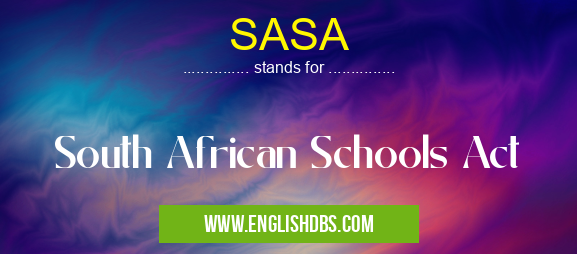What does SASA mean in LEGISLATION
The South African Schools Act (SASA) is a statute that was enacted by the South African government in 1996. This act was intended to provide regional oversight of education, including accountability for educational outcomes and services provided by schools. It is one of the fundamental pieces of legislation governing school systems in South Africa today.

SASA meaning in Legislation in Governmental
SASA mostly used in an acronym Legislation in Category Governmental that means South African Schools Act
Shorthand: SASA,
Full Form: South African Schools Act
For more information of "South African Schools Act", see the section below.
Purpose
The main purpose of SASA is to ensure that all children in South Africa have access to quality education and are able to receive an effective education without discrimination or exclusion based on gender, race, religion or culture. The act requires all public schools to provide an appropriate curriculum; maintain safety and discipline; ensure that all students’ rights are incorporated into their educational experience; promote racial equality; maintain school property appropriately; and conduct assessments for proper learning. The act also provides for greater autonomy for school councils, which are responsible for governing individual schools and implementing the provisions contained in the act.
Requirements
SASA outlines requirements related to student-teacher ratios, classroom facilities, teaching materials, teacher qualifications and training, parental involvement in schooling decisions, admission policies and more. Furthermore, it addresses issues such as corporal punishment prevention, teacher development plans and government support with resources for extra-curricular activities. Finally, SASA also sets up mechanisms to monitor implementation of these requirements through regulatory agencies like provincial departments of education.
Essential Questions and Answers on South African Schools Act in "GOVERNMENTAL»LEGISLATION"
What is the South African Schools Act (SASA)?
The South African Schools Act (SASA) is a law that outlines the rights and responsibilities of all stakeholders in relation to basic education in South Africa. It applies to all public school governing bodies, parents, learners, teachers, principals and other personnel employed at public schools.
Who does the SASA apply to?
The SASA applies to any individual or organisation involved in basic education, including teachers, principals, learners and public school governing bodies.
What rights does the SASA protect?
The SASA protects a range of rights for learners in terms of access to quality education, safety, health and wellbeing, as well as privacy and participation rights. Additionally, it seeks to encourage innovation and diversity in teaching practices.
How does the SASA ensure that learners receive quality education?
Under the SASA, all schools must adhere to certain standards of quality teaching and learning through living up to expectations for infrastructure provision and support services. In addition, it also allows for independent assessments of schools' effectiveness in providing quality education.
What measures are taken by the SASA to protect safety at schools?
The SASA requires that all stakeholders maintain a safe environment within schools so that learners can feel secure when learning. This includes providing resources needed such as secure premises with appropriate lighting and accessible fire exits as well as ensuring protocols for responding promptly to any incidents of violence or bullying are in place.
Does the SASA provide guidance on health and wellbeing requirements?
Yes - under the SASa there are provisions for providing access to clean water and sanitation facilities at schools, as well as promoting healthy eating habits among students. Additionally, it addresses issues such as overcrowding which may have an impact on student health.
What privacy protections does the SASA offer?
Under the act there are a range of provisions addressing how information about students should be collected, stored securely and used appropriately by those involved with their education. For instance only relevant personal information should be collected from students during admission processes or when making decisions about their learning needs.
: Does the act also address learner participation rights?
Yes - under this Act there are specific clauses designed to promote learner engagement with schooling where possible including provision for adequate input into decision-making processes regarding their own education as well allowing students access to academic clubs or societies where available.
: Is instruction provided on how best teachers can support learners through innovation?
Yes - amendments made under 2018 legislation encourage teachers use innovative teaching methods including incorporating technology based tools into classrooms or in using project-based / activity-based instruction techniques when possible.
: Are there consequences for not complying with acts set out by this legislation?
Yes - failure by any stakeholder party to meet commitments stipulated by this act carry punishments such as suspension from practice or financial penalties imposed where necessary.
:What role do parents play under this law?
The SAsa emphasises parent involvement with regards to primary schooling both financially but also through active contribution towards ensuring educational success either through direct contact with respective governing bodies or engaging constructively during parent meetings held at regular intervals throughout each year
Final Words:
Overall, the South African Schools Act (SASA) has been instrumental in promoting effective education throughout the country by providing guidelines on how public education should be managed and monitored at a regional level. It helps ensure fairness and equity for all students while maintaining standards of excellence throughout the system. By doing this it contributes towards creating a system where knowledge can be shared without any form of prejudice or discrimination.
